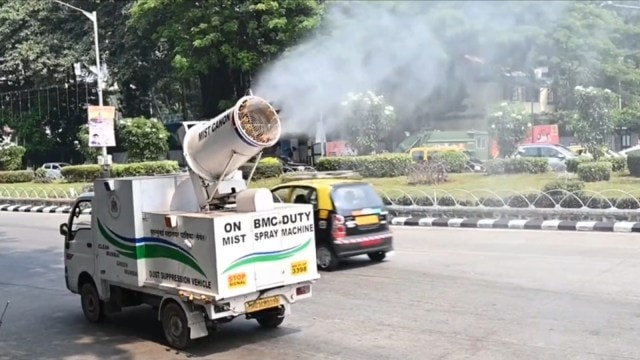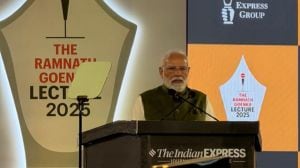Activists, experts raise questions over civic plan to install air purifying systems in city gardens
A pilot project implemented through CSR funds, the purifying units in the garden are slated to become operational over the course of the next ten days.
 The department also stipulated the criteria for high-rise buildings that needed to install the anti-smog guns, barring the monsoon season. (File)
The department also stipulated the criteria for high-rise buildings that needed to install the anti-smog guns, barring the monsoon season. (File)In its ongoing bid to tackle the menace of rising air pollution, the Brihanmumbai Municipal Corporation (BMC) is all set to install air purification systems in six city gardens including Veermata Jijabai Bhosale Udyan and Zoo (Ranibaug), which is among one of the greenest pockets of the city. The move, however, has drawn flak from activists and netizens who have raised questions over the need to deploy air purifying systems in green spaces.
A pilot project implemented through CSR funds, the purifying units in the garden are slated to become operational over the course of the next ten days.
Data from the BMC shows that the six purifiers will be installed at Byculla’s Ranibaug, Wadala’s Bhakti Park which is home to the city’s first ever miyawaki forest, Charni Road’s S K Patil Garden, Dadar’s famed Shivaji Park, and two other systems which will be set up at green spaces in Chembur including Diamond garden.
Speaking to The Indian Express, senior civic officials said that the locations have been finalised by the Maharashtra Pollution Control Board (MPCB) while BMC is the implementing agency.
“Since air and pollutants travel at speed and are shared, these purifiers will absorb pollutants not only from the garden but from nearby areas as well. For instance, a busy road near the garden generates a lot of dust and pollutants, which will be absorbed through these systems,” a senior official said.
While the civic body has maintained that the filters will be instrumental in curbing air pollution from the adjoining areas, city-based activists and experts questioned the decision to install air purifying systems in green spaces with relatively cleaner air, adding that the agencies must consult locals before finalising locations.
Sachida Nand Tripathi, a professor from IIT Kanpur and member of the steering and monitoring committee of the National Clean Air Programme (NCAP) told The Indian Express, “It must be noted that air purifiers, on their own, do very little to improve the ambient air quality in an area. Furthermore, in a garden space, there’s already good air quality therefore, setting up purifiers at parks isn’t practical.”
He added,”While there is no clarity on how much an air purifier can improve the air, the best way to go about using the technology would be to set up smaller and multiple purifiers in an area where a lot of people walk, near a mall, restaurants or similar spaces.”
Bhagwan Kesbhat, CEO, Waatavaran Foundation said the civic body must plant oxygen rich plants in gardens rather than installing air purifiers. “The administrators should consult with citizens and experts before deciding on the locations. Instead of installing air purifiers, which is like installing an air conditioner in the open air, the civic body should plant oxygen rich plants in the garden spaces,” said Kesbhat.
According to other experts, suspended particulate matter such as PM 2.5, one of the primary pollutants in the city, is not entirely mitigated through trees. However, they maintained installation of air purifiers is an expensive affair which may have more of a “psychological effect than real” in reducing air pollution.
Ronak Sutaria, founder of Respirer Living Sciences, said, “PM 2.5 is not entirely mitigated through trees. Installation of these purifiers in gardens must have been considered in a bid to reduce exposure amongst the most vulnerable age groups, including children and old people, who are the most frequent visitors of the gardens. However, air purifiers are not a technologically sound solution to provide clean air.”
“Furthermore, the air purifiers are expensive and even after installation, the filters have to be changed regularly, making maintenance difficult,” said Sutaria, adding that filters in indoor air purifiers have to be changed once every 4-5 months.
Apart from installing these air purifiers in gardens, the civic body is also eyeing installing similar systems at 50 civic-run hospitals. This announcement came on the heels of the decision to affix filtration units on top of 350 BEST run buses.







